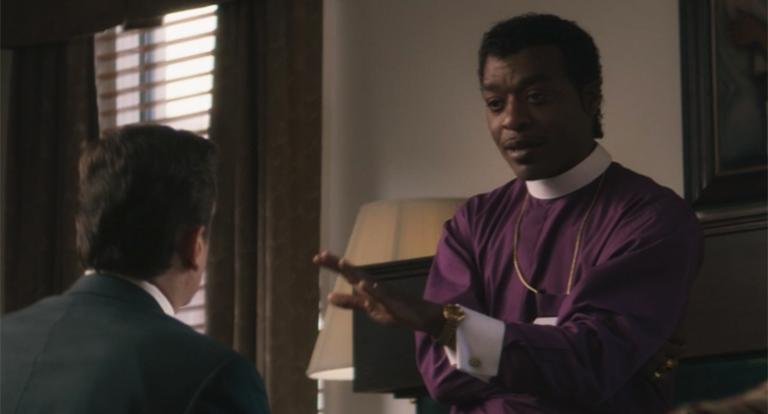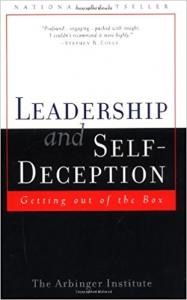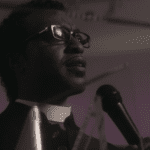But too many of us are ready to cast those who think differently into hell. I sometimes wonder if this is the unpardonable sin: the taking upon ourselves the right to judge others for all eternity instead of recognizing that this privilege belongs only to God, not to us.
In a previous post, I reviewed the forthcoming Netflix movie, COME SUNDAY, which tells the true story of pastor/evangelist Carlton Pearson and his fall from grace when he realized he could no longer believe in hell. The question that many in his horrified congregation posed after his announcement: “Does this means that everyone is saved?”

The question I posed in the original article: “What is it about hell that makes so many Christians giddy with anticipation?”
The question I pose here: “What is it about evolving beliefs that make fellow believers want to cast the questioner into hell?”
Because that has been the pattern all through religious history: Just one deviation from the list of doctrines becomes grounds to tell the searcher, “Go to hell.”
Deep sigh. I have been there. I questioned. Others found the questions threatening to their core beliefs. To maintain their security, it was necessary for them to cast me out. I understand that. I just wonder why we find it so necessary.
In 2005, a joke written by Emo Phillips was voted the Best God Joke ever.
Once I saw this guy on a bridge about to jump.
I said, “Don’t do it!”
He said, “Nobody loves me.”
I said, “God loves you. Do you believe in God?”
He said, “Yes.” I
said, “Are you a Christian or a Jew?”
He said, “A Christian.”
I said, “Me, too! Protestant or Catholic?”
He said, “Protestant.”
I said, “Me, too! What franchise?”
He said, “Baptist.”
I said, “Me, too! Northern Baptist or Southern Baptist?”
He said, “Northern Baptist.”
I said, “Me, too! Northern Conservative Baptist or Northern Liberal Baptist?”
He said, “Northern Conservative Baptist.”
I said, “Me, too! Northern Conservative Baptist Great Lakes Region, or Northern Conservative Baptist Eastern Region?”
He said, “Northern Conservative Baptist Great Lakes Region.”
I said, “Me, too! Northern Conservative†Baptist Great Lakes Region Council of 1879, or Northern Conservative Baptist Great Lakes Region Council of 1912?”
He said, “Northern Conservative Baptist Great Lakes Region Council of 1912.”
I said, “Die, heretic!” And I pushed him over.
Yep, that’s us. That’s what we do. We keep drilling and drilling and drilling trying to force death-inducing but emotionally safe unanimity. The result: commonality is lost, mission is lost, connection is lost, hope is lost.
 An important book I read once, Leadership and Self-Deception, reminds us that most people, when stuck in the box of self-deception where it is impossible to see ourselves clearly, classify others as either “allies” or “enemies.”
An important book I read once, Leadership and Self-Deception, reminds us that most people, when stuck in the box of self-deception where it is impossible to see ourselves clearly, classify others as either “allies” or “enemies.”
In other words, while in that box, the world circles around us; our thoughts, our decisions, our viewpoints have more validity, more truth. Other people have no real intrinsic value other than either to serve as reinforcers to what we believe or as opposers to what we think.
Ultimately, other people become good in our sight ONLY if they are in full agreement with us. Otherwise, it is “Die, heretic!” And out they go. They are not fully human, not capable of making reasonable decisions, not able to find wisdom on their own.
It’s difficult to have one’s belief’s challenged, especially when the challengers have developed good and cogent arguments. Becuase of the difficulties, we too frequently work to silence the challengers rather than learn from them. We ultimately become far less whole and healthy because a good challenge offers space to hone our beliefs and also to recognize our human limitations.
At our worst, we lose the ability to acknowledge, “I might be wrong.”
And yes, I might be wrong about where I have moved in my spiritual life. I know for sure that I see an incomplete picture.
But I, as did Carlton Pearson, also changed my beliefs about God’s desire to see most of humanity, past, present and future, suffer in eternal conscious torment. I also changed my views about the nature of human sexuality.
Those viewpoints evolved as I went deeper into the study of the Holy Scriptures, and as I acknowledged with greater frequency my personal limitations in being able to understand and comprehend the nature of God and what it means to live confidently in the midst of God’s love.
Others have also changed their minds, many of them ordained clergy and knowledgeable laity in The United Methodist Church. Yet they still love and wish to remain in full communion with the UMC. The core convictions remain the same.
Unfortunately, too many, no matter what the theological stance, stand ready to cast those who think differently into hell. I sometimes wonder if this is the unpardonable sin: the taking upon ourselves the right to judge others for all eternity instead of recognizing that this privilege belongs only to God, not to us.
How very easily we deceive ourselves into thinking we have THE final and complete answers to the most difficult questions of life and death.
Photos: Screenshot from the preview provided for me by Netflix of COME SUNDAY;
Book Cover of Leadership and Self Deception from the Amazon.com site.













